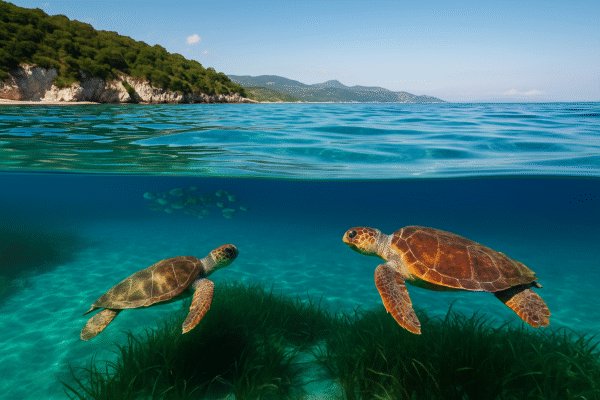Greece, a nation renowned for its stunning coastlines and rich maritime heritage, is taking bold steps to protect its oceans while building a stronger, more sustainable tourism economy. By ratifying the Global Ocean Treaty and expanding Marine Protected Areas (MPAs), Greece is cementing its reputation as a forward-thinking destination where environmental responsibility and tourism development go hand in hand.
With more than 13,000 kilometers of coastline and thousands of islands, Greece’s reliance on its seas for both culture and commerce is undeniable. Now, its leadership in conservation is ensuring that these waters remain a vital resource for generations to come, while simultaneously attracting eco-conscious travelers from around the world.
Marine Protected Areas: Safeguarding Biodiversity
One of the cornerstone strategies in Greece’s sustainability agenda is the expansion of Marine Protected Areas (MPAs). These designated regions shield delicate ecosystems from overfishing, pollution, and the impacts of climate change. They are critical habitats for endangered species such as the loggerhead sea turtle, Mediterranean monk seal, and diverse fish populations that thrive in the Aegean and Ionian seas.
By expanding MPAs, Greece is not only protecting its environment but also creating opportunities for travelers to experience eco-tourism firsthand. Guided tours, diving excursions, and educational programs in these areas allow visitors to witness conservation efforts in action, blending leisure with environmental awareness.
A National Commitment to Sustainable Tourism
Sustainability is no longer an option—it is central to Greece’s tourism strategy. By prioritizing eco-friendly practices, Greece is attracting a new generation of travelers who value authenticity, conservation, and low-impact tourism.
Key initiatives include:
- Green Infrastructure: Investments in renewable energy and eco-friendly accommodations across popular islands.
- Eco-certified Travel Products: Encouraging hotels, restaurants, and tour operators to adopt green certifications.
- Community-Based Tourism: Supporting local businesses and artisans that emphasize cultural and environmental responsibility.
This commitment ensures that sustainable tourism benefits not just the environment but also local economies, providing jobs and boosting resilience in coastal communities.
Culture and Conservation: A Dual Experience
What makes Greece unique is its ability to merge cultural heritage with natural preservation. Ancient ruins, Byzantine monasteries, and traditional villages often sit alongside fragile marine ecosystems. By safeguarding both, Greece offers a holistic tourism experience that enriches visitors culturally and environmentally.
For example, travelers may explore the historic Temple of Poseidon at Cape Sounion while also engaging with nearby marine conservation projects. This dual emphasis on culture and ecology makes Greece a destination where authenticity and sustainability are seamlessly intertwined.
The Global Ocean Treaty: A Landmark for Tourism and Conservation
Greece’s ratification of the Global Ocean Treaty marks a pivotal moment in its environmental journey. The treaty aims to expand protections across international waters, with a global target of safeguarding 30% of marine areas by 2030.
For Greece, this aligns its national priorities with international conservation goals. By implementing the treaty, Greece reinforces its identity as a destination committed to both ocean health and responsible tourism. Visitors who choose Greece are not only enjoying its crystal-clear waters but also supporting a country that is actively working to protect global biodiversity.
Embracing the Circular Economy in Tourism
Central to Greece’s sustainability model is the circular economy, which emphasizes reducing waste, reusing resources, and recycling. Policies encouraging sustainable practices are being applied at every level of the tourism industry.
- Tourist accommodations are adopting renewable energy solutions.
- Recycling programs are being expanded in island destinations.
- Sustainable transport, including electric ferries and green mobility projects, is being piloted in popular tourist hubs.
These initiatives ensure that the tourism boom strengthens, rather than strains, Greece’s natural environment.
Marine Sanctuaries and Sustainable Fisheries
To address overfishing, Greece is creating marine sanctuaries in the Aegean and Ionian seas. These zones regulate fishing practices while promoting sustainable fisheries that protect both biodiversity and the livelihoods of local fishermen.
This balance is critical: protecting ecosystems while maintaining cultural traditions tied to the sea. Tourists benefit too, as seafood sourced from sustainable fisheries offers a guilt-free culinary experience that celebrates local gastronomy while respecting the environment.
A Model for the Mediterranean
Greece’s efforts are already being recognized as a blueprint for Mediterranean sustainable tourism. By harmonizing conservation with economic growth, the country demonstrates how destinations can thrive without sacrificing natural resources.
Neighboring nations are looking to Greece’s model as inspiration for their own marine conservation and eco-tourism initiatives. From Spain to Italy, similar projects are beginning to emerge, signaling a regional shift toward greener tourism economies.
Looking Ahead: Tourism in Harmony with Nature
The future of Greek tourism lies in its ability to balance growth with responsibility. Expanding Marine Protected Areas, embracing the Global Ocean Treaty, and investing in sustainable infrastructure are clear steps toward this vision.
For travelers, this means Greece offers more than stunning views and historical treasures—it offers the chance to be part of a movement that values the planet. Whether snorkeling in protected waters, staying in eco-certified resorts, or enjoying sustainable cuisine, visitors contribute to a greener future.
Conclusion: Greece’s Green Tourism Legacy
Greece’s leadership in marine conservation is redefining the way nations approach tourism. By protecting its seas, promoting sustainable practices, and integrating culture with ecology, Greece is setting new standards for responsible travel worldwide.
As more travelers seek destinations that align with their environmental values, Greece sustainable tourism will only grow in importance, securing the country’s reputation as a global pioneer in eco-friendly travel.
For more travel news like this, keep reading Global Travel Wire


















